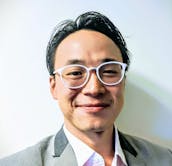Skip to content




 Participant Bios
Participant Bios
-
Earth 2030 Participant Bios
Name
Photo
Affiliation
Bio (100 words)
Longer bio link
Discussion topic(s)
Name
Photo
Affiliation
Bio (100 words)
Longer bio link
Discussion topic(s)
Tony Lai

CodeX Stanford
Tony is a Fellow and Founder of the Blockchain Group at CodeX, Stanford's Center for Legal Informatics. He is a Founding Editor of the Stanford Journal of Blockchain Law and Policy, and of the MIT Computational Law Report. He is also a Senior Adjunct Research Fellow at the Center for Technology, Robotics, A.I. and the Law, at the National University of Singapore.
Tony was the Founding CEO of technology startup, Legal.io, and on the founding team of StartX, the Stanford-affiliated community of entrepreneurs. He holds degrees from Oxford and Stanford, and clocked 10,000 hours as a practicing TMT lawyer.
Improving legal systems and protocols through data governance and frontier technology. Designing collaborations on research efforts with policymakers, companies and academics, globally, as part of the development of a knowledge, learning, and prototyping commons around computational law and its applied counterpart, legal engineering.
Michael Schmitz

CodeX Stanford
Principal of Carbon Counts Group, a policy and strategy engine for initiatives to create comprehensive carbon data ecosystems that drive climate engagement, action and accountability.
CEO & Co-founder of BlueVista, a platform that leverages cutting edge technologies to reward consumers for making clean transportation and mobility choices to reduce air pollution that harms our planet and traffic congestion that undermines our quality of life.
Fellow at CodeX Stanford, leading the Climate Data Policy Initiative, to provide a hub for research and analysis of the data policies required for establishing a robust global climate data ecosystem. Member of the CodeX Blockchain Group, co-coordinating the group’s regulatory tracking initiative.
Global open climate data ecosystem
Dazza Greenwood

MIT and CIVICS.com
Daniel “Dazza” Greenwood is founder of CIVICS.com, a boutique provider of professional consultancy services for legal technologies, automated transactions, data management and technology strategy. Dazza is also a researcher at MIT Media Lab where he is advancing the field of computational law and building out Law.MIT.edu research portfolio.
Dazza consults to fortune 100 companies, architecting and building integrated business, legal and technology cross-boundary networks at industry scale. As an attorney, Dazza served as both in-house and special counsel for technology law, representing corporations and governments. Dazza has testified before the US House, US Senate and other legislatures on electronic transactions law and consults extensively to the public sector, including to NASA, GSA, DHS, the UK Cabinet Office and many other public and private sector organizations and global NGOs.
Combatting COVID-19 with Data. Also like talking/learning about interoperability and automated legal entities.
Steven Nam

Stanford Journal of Blockchain Law & Policy
Steven Nam is Managing Editor of the Stanford Journal of Blockchain Law & Policy and an advisor for the MIT Media Lab’s Digital Currency Initiative, where he supports their Cryptoeconomic Systems Journal. Mr. Nam was previously an antitrust attorney with Jones Day, Distinguished Practitioner at Stanford’s Center for East Asian Studies and Chief Strategy Officer for a Palo Alto-based blockchain startup. Mr. Nam double majored in History and Ethnicity, Race & Migration at Yale.
There are no rows in this table
Want to print your doc?
This is not the way.
This is not the way.

Try clicking the ··· in the right corner or using a keyboard shortcut (
CtrlP
) instead.